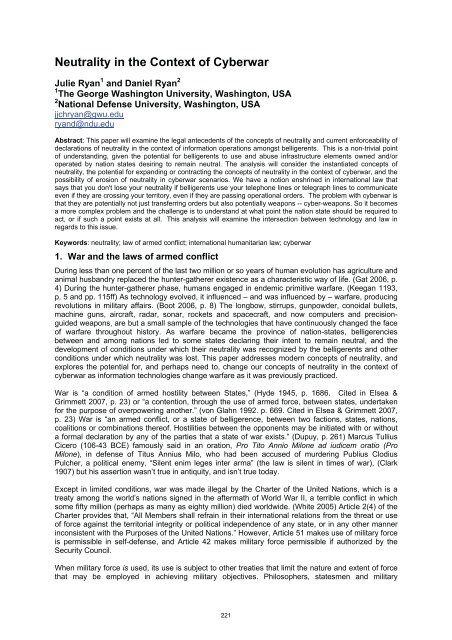6th European Conference - Academic Conferences
6th European Conference - Academic Conferences
6th European Conference - Academic Conferences
Create successful ePaper yourself
Turn your PDF publications into a flip-book with our unique Google optimized e-Paper software.
Neutrality in the Context of Cyberwar<br />
Julie Ryan 1 and Daniel Ryan 2<br />
1 The George Washington University, Washington, USA<br />
2 National Defense University, Washington, USA<br />
jjchryan@gwu.edu<br />
ryand@ndu.edu<br />
Abstract: This paper will examine the legal antecedents of the concepts of neutrality and current enforceability of<br />
declarations of neutrality in the context of information operations amongst belligerents. This is a non-trivial point<br />
of understanding, given the potential for belligerents to use and abuse infrastructure elements owned and/or<br />
operated by nation states desiring to remain neutral. The analysis will consider the instantiated concepts of<br />
neutrality, the potential for expanding or contracting the concepts of neutrality in the context of cyberwar, and the<br />
possibility of erosion of neutrality in cyberwar scenarios. We have a notion enshrined in international law that<br />
says that you don't lose your neutrality if belligerents use your telephone lines or telegraph lines to communicate<br />
even if they are crossing your territory, even if they are passing operational orders. The problem with cyberwar is<br />
that they are potentially not just transferring orders but also potentially weapons -- cyber-weapons. So it becomes<br />
a more complex problem and the challenge is to understand at what point the nation state should be required to<br />
act, or if such a point exists at all. This analysis will examine the intersection between technology and law in<br />
regards to this issue.<br />
Keywords: neutrality; law of armed conflict; international humanitarian law; cyberwar<br />
1. War and the laws of armed conflict<br />
During less than one percent of the last two million or so years of human evolution has agriculture and<br />
animal husbandry replaced the hunter-gatherer existence as a characteristic way of life. (Gat 2006, p.<br />
4) During the hunter-gatherer phase, humans engaged in endemic primitive warfare. (Keegan 1193,<br />
p. 5 and pp. 115ff) As technology evolved, it influenced – and was influenced by – warfare, producing<br />
revolutions in military affairs. (Boot 2006, p. 8) The longbow, stirrups, gunpowder, conoidal bullets,<br />
machine guns, aircraft, radar, sonar, rockets and spacecraft, and now computers and precisionguided<br />
weapons, are but a small sample of the technologies that have continuously changed the face<br />
of warfare throughout history. As warfare became the province of nation-states, belligerencies<br />
between and among nations led to some states declaring their intent to remain neutral, and the<br />
development of conditions under which their neutrality was recognized by the belligerents and other<br />
conditions under which neutrality was lost. This paper addresses modern concepts of neutrality, and<br />
explores the potential for, and perhaps need to, change our concepts of neutrality in the context of<br />
cyberwar as information technologies change warfare as it was previously practiced.<br />
War is “a condition of armed hostility between States,” (Hyde 1945, p. 1686. Cited in Elsea &<br />
Grimmett 2007, p. 23) or “a contention, through the use of armed force, between states, undertaken<br />
for the purpose of overpowering another.” (von Glahn 1992. p. 669. Cited in Elsea & Grimmett 2007,<br />
p. 23) War is “an armed conflict, or a state of belligerence, between two factions, states, nations,<br />
coalitions or combinations thereof. Hostilities between the opponents may be initiated with or without<br />
a formal declaration by any of the parties that a state of war exists.” (Dupuy, p. 261) Marcus Tullius<br />
Cicero (106-43 BCE) famously said in an oration, Pro Tito Annio Milone ad iudicem oratio (Pro<br />
Milone), in defense of Titus Annius Milo, who had been accused of murdering Publius Clodius<br />
Pulcher, a political enemy, “Silent enim leges inter arma” (the law is silent in times of war), (Clark<br />
1907) but his assertion wasn’t true in antiquity, and isn’t true today.<br />
Except in limited conditions, war was made illegal by the Charter of the United Nations, which is a<br />
treaty among the world’s nations signed in the aftermath of World War II, a terrible conflict in which<br />
some fifty million (perhaps as many as eighty million) died worldwide. (White 2005) Article 2(4) of the<br />
Charter provides that, “All Members shall refrain in their international relations from the threat or use<br />
of force against the territorial integrity or political independence of any state, or in any other manner<br />
inconsistent with the Purposes of the United Nations.” However, Article 51 makes use of military force<br />
is permissible in self-defense, and Article 42 makes military force permissible if authorized by the<br />
Security Council.<br />
When military force is used, its use is subject to other treaties that limit the nature and extent of force<br />
that may be employed in achieving military objectives. Philosophers, statesmen and military<br />
221

















